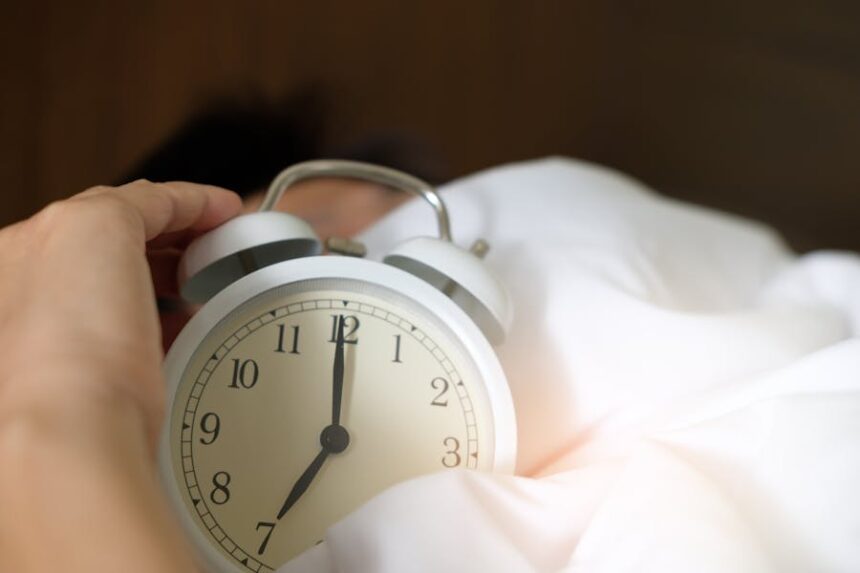Waking up in the middle of the night is frustrating. It breaks your rest, leaves you tired the next day, and often makes it hard to fall back asleep. For many people, 3 a.m. seems to be the time when this happens again and again.
For some, this is just a brief disruption. For others, it becomes a nightly pattern that ruins sleep quality and affects their health. You may feel fine at bedtime, drift off easily, and then suddenly find yourself awake in the early morning hours. And once you’re up, your mind starts racing.
This article explains what might be causing these early wake-ups and how different factors in your body and habits could be playing a role.
Melatonin May Drop Too Soon
Melatonin is a hormone that helps your body know it’s time to sleep. It usually rises in the evening and stays high through most of the night. But in some people, melatonin levels rise too early and start falling before the night is over.
This drop can cause you to wake up in the early hours, especially if it happens around the same time each night. When melatonin declines too soon, your brain gets signals that it’s time to be alert. This disrupts deep sleep and causes sudden, unwanted alertness.
Some people use sleep aids to deal with this, but those can wear off too quickly. That’s where controlled release melatonin comes in. It’s designed to stay in your system longer, which helps maintain stable melatonin levels during the full sleep cycle.
Your Internal Clock May Be Out of Sync
The circadian rhythm is what controls when you feel sleepy and when you feel awake. This rhythm works based on cues like light and darkness and usually follows a 24-hour pattern.
If your internal clock shifts even slightly, your sleep schedule can be affected. Waking up too early is a sign that your rhythm may be misaligned. This can happen if you go to bed or wake up at different times each day, get too much screen exposure at night, or live in a place with irregular lighting.
When your rhythm is off, your body might think it’s time to get up even when it isn’t. That’s why you may find yourself fully awake at 3 a.m., even if you haven’t had enough rest.
Stress and Cortisol Can Interrupt Rest
Stress affects your body in many ways, and sleep is one of them. When you’re stressed, your body produces more , which is a hormone that helps keep you alert. Normally, cortisol should be low at night and rise in the morning.
But if cortisol rises too early—like at 3 a.m.—it can wake you up. You might feel wide awake, and your mind may start going over the day’s worries. Even if you don’t feel stressed during the day, your body may still be reacting to pressure in the background.
This kind of stress-driven wake-up often happens in people who work long hours or have a lot on their minds. Managing daily stress through regular habits can help lower those early spikes in cortisol.
Blood Sugar Dips Can Trigger Wake-Ups
Your blood sugar levels change during sleep. If they drop too low, your body responds by releasing hormones that can wake you up. This is more likely to happen if you eat a sugary snack or heavy meal right before bed.
The crash in blood sugar a few hours later can act like an internal alarm. You might not feel hungry, but your body feels the shift and wakes you up to fix it.
Keeping your evening meals balanced with protein, fiber, and healthy fats can help prevent these dips. It’s best to avoid snacks high in sugar late at night.
Alcohol Can Disrupt the Second Half of Sleep
Many people think alcohol helps them sleep. While it can make you fall asleep faster, it also interferes with deeper sleep stages. After a few hours, is processed by your body, and this can cause restlessness or early wake-ups.
This effect is often delayed. That’s why someone may fall asleep easily after a drink but wake up around 3 a.m. feeling alert or anxious. The body is trying to adjust after breaking down the alcohol, and that process can interrupt sleep.
If this happens often, cutting back on alcohol in the evening may make a noticeable difference in how well you sleep through the night.
Nighttime Bathroom Trips Can Disrupt Sleep
Waking up to use the bathroom once in a while is normal, especially if you drink fluids close to bedtime. But if it happens regularly, it can break your sleep cycle. Over time, your brain may start expecting these wake-ups, making them harder to stop.
Frequent nighttime urination can be caused by more than just water. Caffeine, alcohol, and even certain medications can increase how often you need to go. Age can also play a role, as the bladder changes over time.
If you notice this happening often, try limiting fluids in the two hours before bed. Also, consider whether anything you’re eating or drinking might be causing the issue. Staying mindful of your routine may reduce unnecessary trips to the bathroom.
Mental Health Can Influence Sleep Quality
Mental health plays a major role in how well you sleep. People dealing with anxiety or depression often have trouble staying asleep. One common pattern is waking up too early and feeling unable to relax again.
Even if symptoms aren’t obvious during the day, sleep issues like this can be an early sign of a mood problem. Waking up at 3 a.m. with racing thoughts is often linked to stress or emotional strain.
If this happens regularly and you feel down or anxious during the day, it may be time to speak with a mental health professional. Managing these issues can improve both your sleep and your overall well-being.
Waking up at 3 a.m. every night may seem like a small issue, but it can have a big impact on your health and energy. There are many reasons this happens—your body clock, hormones, stress, diet, age, or even your environment. The good news is that once you understand what’s causing the disruption, you can begin to make small changes that support better sleep.
For many, using the right tools can help maintain a more stable sleep cycle. But just as important are your daily habits and nighttime routine. By paying attention to what your body is telling you, you can take real steps toward getting the full night’s rest you need.




